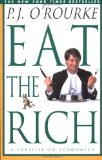Summary | Excerpt | Reviews | Readalikes | Genres & Themes | Author Bio

Critics' Opinion:
Readers' Opinion:
First Published:
Sep 1998, 240 pages
Paperback:
Sep 1999, 255 pages
Chapter One
Love, Death, and Money
I had one fundamental question about economics: Why do some places prosper
and thrive while others just suck? It's not a matter of brains. No part of the
earth (with the possible exception of Brentwood) is dumber than Beverly Hills,
and the residents are wading in gravy. In Russia, meanwhile, where chess is a
spectator sport, they're boiling stones for soup. Nor can education be the
reason. Fourth graders in the American school system know what a condom is but
aren't sure about 9 x 7. Natural resources aren't the answer. Africa has
diamonds, gold, uranium, you name it. Scandinavia has little and is frozen
besides. Maybe culture is the key, but wealthy regions such as the local mall
are famous for lacking it.
Perhaps the good life's secret lies in civilization. The Chinese had an
ancient and sophisticated civilization when my relatives were hunkering naked in
trees. (Admittedly that was last week, but they'd been drinking.) In 1000 B.C.,
when Europeans were barely using metal to hit each other over the head, the Zhou
dynasty Chinese were casting ornate wine vessels big enough to take a bath
in--something else no contemporary European had done. Yet, today, China stinks.
Government does not cause affluence. Citizens of totalitarian countries have
plenty of government and nothing of anything else. And absence of government
doesn't work, either. For a million years mankind had no government at all, and everyone's
relatives were naked in trees. Plain hard work is not the source of plenty. The
poorer people are, the plainer and harder is the work that they do. The
better-off play golf. And technology provides no guarantee of creature comforts.
The most wretched locales in the world are well-supplied with complex and
up-to-date technology--in the form of weapons.
Why are some places wealthy and other places poor? It occurred to me, at
last, that this might have something to do with money.
But I didn't know anything about money. I didn't know anything about money as
a practical matter--did I have enough to pay the mortgage? And I didn't know
anything about money in a broad or abstract sense. I certainly didn't know
anything about economic theory. And I wasn't alone in this.
I couldn't answer the central question of this book because I was an economic
idiot. I got to be an economic idiot by the simple and natural method of being
human. Humans have trouble with economics, as you may have noticed, and not just
because economic circumstances sometimes cause them to starve. Humans seem to
have an innate inability to pay attention to economic principles.
Love, death, and money--these are the three main human concerns. We're all
keen students of love. We are fascinated by every aspect of the matter, in
theory and in practice--from precise biological observations of thrusting this
and gaping that to ethereal sentimentalities marketed in miles of aisles at
Hallmark stores. No variety of love is too trivial for exegesis. No aspect of
love is so ridiculous that it hasn't been exhaustively reviewed by the great
thinkers, the great artists, and the great hosts of daytime talk shows.
As for death, such is the public appetite for investigation of the subject
that the highest-rated television program in America is about an emergency room.
The most hardheaded and unspeculative of persons has his notions of eschatology.
The dullest mind can reason extensively about what causes kicking the bucket.
Dying sparks our intellectual curiosity.
But money does not. All we care about is the thing itself, preferably in
large amounts. We care a very great deal about that. But here our brain work
stops. We don't seem to mind where our money comes from. And, in an affluent
society, we don't even seem to mind where our money goes. As for larger
questions about money, we shrug our shoulders and say, "I wish I had
more."
From Eat the Rich, by P. J. O'Rourke. © September 1998 , P. J. O'Rourke. Used by permission.





The Flower Sisters
by Michelle Collins Anderson
From the new Fannie Flagg of the Ozarks, a richly-woven story of family, forgiveness, and reinvention.

The House on Biscayne Bay
by Chanel Cleeton
As death stalks a gothic mansion in Miami, the lives of two women intertwine as the past and present collide.

The Funeral Cryer by Wenyan Lu
Debut novelist Wenyan Lu brings us this witty yet profound story about one woman's midlife reawakening in contemporary rural China.
Your guide toexceptional books
BookBrowse seeks out and recommends the best in contemporary fiction and nonfiction—books that not only engage and entertain but also deepen our understanding of ourselves and the world around us.